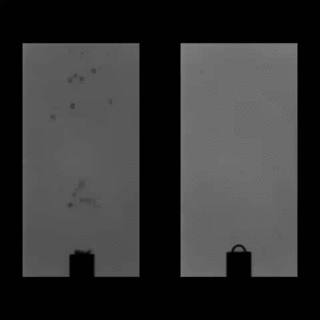-
Dielectric liquid boiling heat transfer characteristics
Observe boiling phenomena from nucleation to CHF
Compare boiling characteristics between water and dielectric liquid (NOVEC 649)

Water
NOVEC 649





Nucleation ~ 20% CHF ~ 60% CHF Near CHF



-
Two-phase flow behavior through inverted-U shape tube
Observe two-phase flow through inverted-U shape tube with temperature and pressure variation.
Trace cavitation bubbles (by sudden pressure drop) and boiling bubble (by heating).
Identify the mechanism of gas accumulation using ultrasonic transducer, and measure the characteristics of two-phase flows using impedence meter and high-speed camera.

-
Flow Instability in a narrow rectangular channel
Experimental study on ONB, OSV, and OFI incipient for a narrow rectangular channel heated from one side
Constant mass flux approach is consistent with constant heat flux approach
Influence of mass flux, heat flux, and inlet subcooled temperature on the ONB and OFI phenomena is observed.

-
Pool boiling experiments at various surface orientations
Study bubble behaviors and Critical Heat Flux (CHF) on PCB heater at 0, 45, 90, 135, and 180 degree surface orientations
Investigate effects of surface orientations on ONB heat flux, and observe bubble behaviors on the heated wall
Analyze bubble characteristics; bubble departure diameter, frequency, nucleate site density, and hydrodynamic instability.

Condensable Non-condensable
-
Prediction of Nucleate Boiling by sensing pressure wave of collapsing bubbles in subcooled water
Develop technologies to predict nucleate boiling by sensing pressure wave of collapsing bubbles.
Characterize collapsing processes with different subcooled temperature and vapor sizes.
Measure characteristics of vapors using a high-speed camera and hydrophone.
Evaluate the existing vapor collapsing models based on experimental data.

3 mm
-
Onset of Nucleate Boiling (ONB) & wall boiling phenomena experiments in narrow rectangular channel
Study wall boiling phenomena under forced convective upward flow with uniform and non-uniform heat flux
Observe ONB incipient by visualization, and measure temperature slope change
Study OSV (Onset of Significant Void) by measureing presure drop change
Study different wall boiling phenomena under various heating conditions


-
Thermal hydraulic and safety analyses of U-Mo fuel and targets irradiated in HANARO research reactor
As part of the nuclear fuel qualification program, U-Mo mini and full length fuel plates were irradiated in the HANARO reactor.
Before irradiation tests, the mini and full length fuel plates must go through safety assessment to assure the reactor safety.
Neutronic and thermal hydraulic characteristics of U-Mo fuel plates were analyzed using MCNP and TMAP codes

-
Critical Heat Flux (CHF) experiment in narrow rectangular channel
Study on boiling phenomena especially in CHF in a narrow rectangular channel (50 mm x 2.35 mm) to support research reactor design and licensing.
CHF was determined by measuring sudden wall temperature jump and visual observation of the bright light illuminated from the wall.
Boiling phenomena was studied for different flow directions (i.e. upward and downward) and various flow conditioins (i.e. forced and natural convective cooling)

-
Bubble coalescence and breakup in packed-bed
Bubble interactions such as coalescence and breakup in packed-bed were investigated using 2-D test section.
Bubble particle density, size, void fraction, and velocity were measured along the axial direction.
Dominant bubble interactions were identified and modeled, and new bubble interaction models proposed in the study were implemented into CFD analyses for validation.

-
Measurements of Two-phase flow characteristics using conductivity probes
Two-phase flow characteristics were measured using different types of conductivity probes (i.e. film thickness probe and flush probe)
Liquid flim thickness under trickling flow was measured, and measured liquid film shape was used to develop a wavy film model.